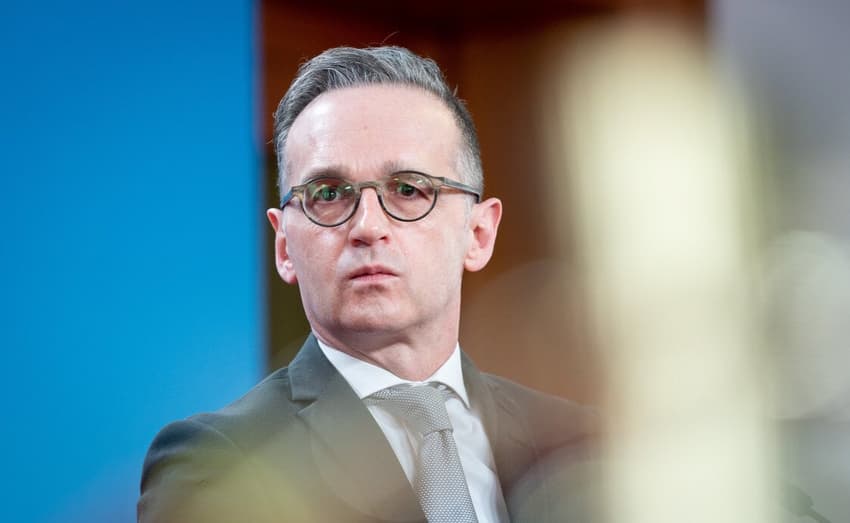Germany warns Russia it will 'defend itself' against targeted disinformation in election year

Germany is expecting to be the target of Russian disinformation in the run-up to elections this year, Foreign Minister Heiko Maas said Friday, calling such practices "completely unacceptable".
"Targeted influence and disinformation campaigns from the Russian side (...) must stop. And if they do not, we will also defend ourselves against them," Maas said in comments published by the Deutsche Welle broadcaster.
Asked whether he feared that general elections in Germany in September could be affected by such campaigns, Maas said: "Either way, we are vigilant."
"I hope that experiences with this in the past will prevent it from happening in the Bundestag election campaign in Germany," he said.
A report published last week by the European External Action Service (EEAS) named Germany as the top target in Europe for Russian disinformation campaigns and cyber activities.
READ MORE: German man arrested on suspicion of spying for Russia from Reichstag
"No other EU member state is being attacked more violently than Germany," it said, citing 700 cases of disinformation targeting Germany since 2015 - compared with 300 for France, 170 for Italy and 40 for Spain.
Such operations peaked after Russia accused Germany of pushing through sanctions against the Kremlin during its EU presidency from July to December 2020, the report said.
"We are arming ourselves against this, but of course we expect it to stop," Maas said, calling such practices "completely unacceptable".
Ties between Germany and Russia have become increasingly strained in recent months over the poisoning and imprisonment of opposition leader Alexei Navalny.
Chancellor Angela Merkel has always stressed the importance of keeping dialogue open with President Vladimir Putin, but told parliament last May that she had concrete proof that Russia was targeting her in cyber attacks.
Among the most high-profile attacks laid at Russian hackers' feet by German intelligence is a cyber assault on the German parliament in 2015.
A US government report last week accused Russia of targeting election infrastructure during the 2020 US vote, though it concluded the campaigns did not compromise any of the results.
The Kremlin dismissed the allegations as "absolutely groundless".
SEE ALSO: German foreign minister threatens Russia with sanctions over Navalny poisoning
Comments
See Also
"Targeted influence and disinformation campaigns from the Russian side (...) must stop. And if they do not, we will also defend ourselves against them," Maas said in comments published by the Deutsche Welle broadcaster.
Asked whether he feared that general elections in Germany in September could be affected by such campaigns, Maas said: "Either way, we are vigilant."
"I hope that experiences with this in the past will prevent it from happening in the Bundestag election campaign in Germany," he said.
A report published last week by the European External Action Service (EEAS) named Germany as the top target in Europe for Russian disinformation campaigns and cyber activities.
READ MORE: German man arrested on suspicion of spying for Russia from Reichstag
"No other EU member state is being attacked more violently than Germany," it said, citing 700 cases of disinformation targeting Germany since 2015 - compared with 300 for France, 170 for Italy and 40 for Spain.
Such operations peaked after Russia accused Germany of pushing through sanctions against the Kremlin during its EU presidency from July to December 2020, the report said.
"We are arming ourselves against this, but of course we expect it to stop," Maas said, calling such practices "completely unacceptable".
Ties between Germany and Russia have become increasingly strained in recent months over the poisoning and imprisonment of opposition leader Alexei Navalny.
Chancellor Angela Merkel has always stressed the importance of keeping dialogue open with President Vladimir Putin, but told parliament last May that she had concrete proof that Russia was targeting her in cyber attacks.
Among the most high-profile attacks laid at Russian hackers' feet by German intelligence is a cyber assault on the German parliament in 2015.
A US government report last week accused Russia of targeting election infrastructure during the 2020 US vote, though it concluded the campaigns did not compromise any of the results.
The Kremlin dismissed the allegations as "absolutely groundless".
SEE ALSO: German foreign minister threatens Russia with sanctions over Navalny poisoning
Join the conversation in our comments section below. Share your own views and experience and if you have a question or suggestion for our journalists then email us at [email protected].
Please keep comments civil, constructive and on topic – and make sure to read our terms of use before getting involved.
Please log in here to leave a comment.